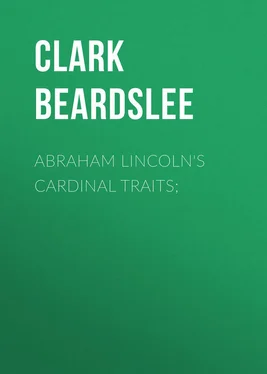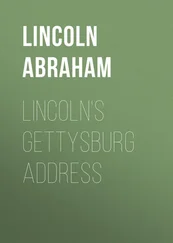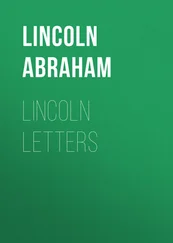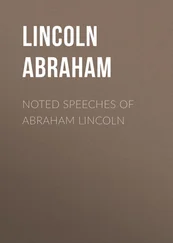Clark Beardslee - Abraham Lincoln's Cardinal Traits;
Здесь есть возможность читать онлайн «Clark Beardslee - Abraham Lincoln's Cardinal Traits;» — ознакомительный отрывок электронной книги совершенно бесплатно, а после прочтения отрывка купить полную версию. В некоторых случаях можно слушать аудио, скачать через торрент в формате fb2 и присутствует краткое содержание. Издательство: Иностранный паблик, Жанр: foreign_antique, foreign_prose, на английском языке. Описание произведения, (предисловие) а так же отзывы посетителей доступны на портале библиотеки ЛибКат.
- Название:Abraham Lincoln's Cardinal Traits;
- Автор:
- Издательство:Иностранный паблик
- Жанр:
- Год:неизвестен
- ISBN:нет данных
- Рейтинг книги:3 / 5. Голосов: 1
-
Избранное:Добавить в избранное
- Отзывы:
-
Ваша оценка:
- 60
- 1
- 2
- 3
- 4
- 5
Abraham Lincoln's Cardinal Traits;: краткое содержание, описание и аннотация
Предлагаем к чтению аннотацию, описание, краткое содержание или предисловие (зависит от того, что написал сам автор книги «Abraham Lincoln's Cardinal Traits;»). Если вы не нашли необходимую информацию о книге — напишите в комментариях, мы постараемся отыскать её.
Abraham Lincoln's Cardinal Traits; — читать онлайн ознакомительный отрывок
Ниже представлен текст книги, разбитый по страницам. Система сохранения места последней прочитанной страницы, позволяет с удобством читать онлайн бесплатно книгу «Abraham Lincoln's Cardinal Traits;», без необходимости каждый раз заново искать на чём Вы остановились. Поставьте закладку, и сможете в любой момент перейти на страницу, на которой закончили чтение.
Интервал:
Закладка:
But Lincoln's idealism, again be it said, was no wild indulgence of a vagrant and untrained imagination. It was utterly sober-minded. It took its form and found its force in the center of his sanest thoughtfulness. The terms in which its description has just been illustratively traced show it to be perfectly rational, and even matter-of-fact. Lincoln's idealism was nothing else but a heedful interpretation of the proper destiny of man. It was a reflection in terms of carefulest thought, albeit also in the guise of ardent hope, of the essential lineaments in the nature of man. And no human portrait by any artist was ever truer to fact, while yet tinged with fancy, pure and free. In all his picturing of things yet to be, but not yet in hand, his eye was fastened with an anatomist's intentness upon the actual human nature imperishably present in every man. Nothing that Lincoln's idealism ever proposed ever diverged from the bounds of the original fiat creating all men equal and free. That undeniable initial verity, itself the keystone of our national Constitution and Bill of Rights, supplied to Lincoln's hope its total and only inspiration. In those ancient and elemental realities, realities that deeply underlie and long outlast all the cults and customs and centuries which human thought is so prone to differentiate and divide, Lincoln detected solid foundations and ample warrant for age-long, undissolving expectations. In every human face there are outlines that are forever indelible. These unfailing lineaments Lincoln had the eye to see. And what is vastly more, he had the courage and the honesty to adopt them as the pattern of the platform, and to voice them as the notes of the battle-peal of his statesmanship. And this he did right wittingly, knowing assuredly that therein his vision had caught the gleam of things eternal; that therein he had made discovery that man, even the humblest of his race, could claim to be, as he phrased it to a company of blacks, "kindred to the great God who made him." This amounts to saying that Lincoln's statesmanship may be completely and precisely defined as the studied and deliberate exploitation, upon the field of politics, of those forces, central and common in all mankind, that are Godlike, immortal, spiritual.
Here we reach a definition that outlines with close precision a trait of Lincoln's full-formed character that held a primary place in winning for Lincoln his immortal renown. He attached himself to things themselves immortal. His ideal hope had no admixture of clay, nor even of gold. He made no composition or compromise with anything that dies. His supreme desire was of a nature never to decay. It was pure with the deathless purity of the human soul. To this pure principle, eternal loyalty to the immortal dignity of man, he signed and sealed his soul's allegiance with bonds that even death could never relax. Such statements describe a primary co-efficient in Lincoln's ethical life. Abjuring the unnumbered allurements of the material world, allurements whose fascinations unfailingly fade, and reposing his confidence wholly in treasures that time and use only brighten and refine, Lincoln reveals in the realm of ethics the singular excellence of an ideal that can kindle in an immortal man an immortal hope. Purging every sort of baseness out of the central life, and enthroning an all-refining pureness in the sovereign desires and visions and designs, he has inaugurated in the field of civics an idealism that will honor every man, fit actual life, and endure forever. Personal pureness, this pervades the life of Lincoln as crystalline beauty pervades a block of marble.
This refining trait in Lincoln, this inner hunger for his living soul's true nutriment, this thirst for the pure, perennial springs, finds signal illustration in the closing sentence of this last inaugural, where he pleads with all his fellow-citizens to so conduct all civic interests as to secure among ourselves and with all Nations a "lasting peace." That craving after permanence in civic harmony betokens an impulse towards immortality; and rests down, as the entire inaugural explains, upon that only basis of enduring civic quietude, an honest and universal recognition and respect for those indelible and universal lineaments of personal dignity which the Creator of men has traced upon every human soul – lineaments from which the obscuring dross of centuries was being purged in the Providential fires of an awful war. Just this was the meaning of the war, as Lincoln understood its work. That earth-born sordidness which marked all slaves as common chattels, was being burnt out of our national life, as our basest national sin. Thenceforth, forevermore, it was Lincoln's living hope that all mankind might peacefully agree to supremely cherish and mutually respect those human values that human unfriendliness, and centuries of contempt, however deeply they may obscure, can never obliterate. Upon such enduring foundations, and upon such foundations alone, Lincoln clearly saw, could human peace endure.
And upon this same foundation rests his first inaugural as well. In all those months of special study, ensuing between his election in November of 1860 and his inauguration in March in 1861, and for an ample seven years before, Lincoln was feeling after civic perpetuity. And when he stood before the Nation to publish his first inaugural address, his supreme concern was fixed upon the threatened and impending ruin of the Republic. He there faced a menacing South, irreconcilable, and resolute for dissolution or blood. That outcrying situation brought final issues near. Must the Union perish? Could the Union endure? Civic dissolution or civic perpetuity – this was the immediate, the unrelieved, the ominous alternative. In the fiery heat of civic hate, flaming into civil war, Lincoln had to seek for civic principles that hate could not subvert, nor the fires of war consume; principles too strong to admit defeat, too pure to be dissolved.
Never did a statesman bend over a graver task, nor with a more honest and patient heart, nor with a mind more divinely fashioned and furnished to comprehend and penetrate the actual case in hand. As in a chemist's alembic, he fused and tried our Constitution and all our history. Into that first inaugural he incorporated the issues of his thought. And this was its simple, sole result: – Slavery is "the only substantial dispute." With the people is "ultimate justice." With God is "ultimate truth." We are not "enemies." We are "friends." In this supreme dispute let us confer and legislate as friends, and then as friends live together in an amity that shall be perpetual. This is the uncompounded essence of his first inaugural, as of all his political philosophy. In universal freedom, by mutual persuasion, and in even friendliness, let our Union forever endure. Here again is a statesman's publication and heroic defense of a pure, immortal hope, voiced in an appeal and upheld by arguments as spiritual and pure as the inmost being and utmost destiny of the living souls of men.
No study of the transcendent momentum in Lincoln's life of spiritual realities can fairly overlook his speech in Peoria, October 16, 1854. It is, as he said at the time, "substantially" a repetition of an address at Springfield, twelve days before. It "made Lincoln a power in national politics." It was the commanding beginning of his commanding career. That year, 1854, began the convulsion which made him president, involved the war, and ended in his violent death. As matters stood on New Year of 1854, slavery was, by act of Congress in the Missouri Compromise of 1820, thenceforth forbidden to spread anywhere in United States territory north of the southern boundary of Missouri. In the early half of 1854 Senator Douglas drove through Congress a bill, creating the territory of Nebraska, which declared the Compromise prohibition of 1820 "inoperative and void." Thenceforth slavery might spread anywhere. This is the "repeal" of the Missouri Compromise.
Читать дальшеИнтервал:
Закладка:
Похожие книги на «Abraham Lincoln's Cardinal Traits;»
Представляем Вашему вниманию похожие книги на «Abraham Lincoln's Cardinal Traits;» списком для выбора. Мы отобрали схожую по названию и смыслу литературу в надежде предоставить читателям больше вариантов отыскать новые, интересные, ещё непрочитанные произведения.
Обсуждение, отзывы о книге «Abraham Lincoln's Cardinal Traits;» и просто собственные мнения читателей. Оставьте ваши комментарии, напишите, что Вы думаете о произведении, его смысле или главных героях. Укажите что конкретно понравилось, а что нет, и почему Вы так считаете.












